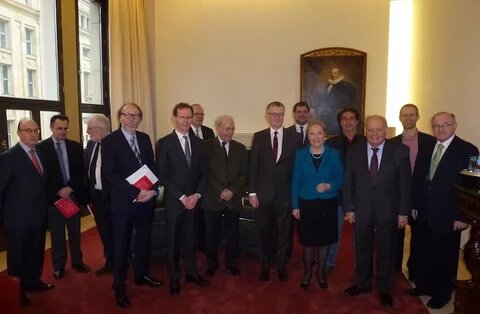About one hundred academics, politicians and the diplomatic corps gathered on March 6 to discuss, under the auspices of the EU-LAC Foundation and the Ibero-American General Secretariat (SEGIB) on “Latin America and the Caribbean in the context of changes: Opportunities and challenges for the EU.” The forum, held at the Representation of the city-state of Hamburg in Berlin, was inaugurated by the President of the EU-LAC Foundation, Benita Ferrero-Waldner, and counted with Enrique Iglesias, the Ibero-American Secretary, as a guest of honour. The interventions of Ferrero-Waldner and Iglesias were preceded by welcoming remarks of the Secretary of State of the Senate of Hamburg, Wolfgang Schmidt, and the Secretary of State of the German Ministry of Foreign Affairs, Stephan Steinlein.
CHANGING CYCLES
Mr. Iglesias analysed through historical perspective the situation in Latin America and highlighted the progress made in recent decades, especially in the fight against poverty and fiscal policy, but said he would like to see more equality, more social policies, more institutional development and more productivity stimulus. “We have advanced, but there is still a long way to the Promised Land,” he said.
The Ibero-American Secretary also referred to the public protests that occur in the region, although without mentioning specific countries or engaging in ideological parallelism, because, we can “no longer speak of left nor right,” from his point of view.
In his opinion, many of the current difficulties are the result of economic change that is occurring in the world, which he referred to as “the greatest in the history of mankind.”
He explained that, in the case of Latin America, this change has meant the end of what he called “the American Cycle” in favour of “the Chinese Cycle,” a shift of forces that opens a relationship, still “to be defined,” between China and Latin America and which, according to Iglesias, should be used by Latin America to truly access the “value chain” because “it would be an error to live only of the raw materials,” he said.
VALIDITY OF THE EUROPEAN SOCIAL MODEL
Benita Ferrero-Waldner, in the same vein, said that the changes that are detected in Europe and Latin America, although distinct, are part of a global change. Thus, meanwhile the economic crisis takes its toll on the mind and vision of many Europeans; Latin America attends the emancipation of the middle class that has emerged after years of growth.
“In both hemispheres, a generation was born with an entrepreneurial spirit thinking not only for themselves, which is essential for democracy, but seeking to make their own path,” said the EU-LAC Foundation President.
In this context, she noted the risk that both regions could be tempted to leave the bases on which they built their societies on the alleged lack of credibility of the European social model, a debate to which Ferrero-Waldner anticipated her response, confirming that she is convinced by this model, “valid for Europe and other regions in the world,” she said.
The President was equally convinced of the need to maintain and strengthen international ties with the argument that “we must find common solutions to global challenges” and that the major changes that faced by the European Union, Latin America and the Caribbean (LAC), far from being a danger, are “a unique opportunity” to strengthen ties and find answers that would “allow us to shape the world.”
THE SUMMITS DO NOT BRING THE PEOPLE TOGETHER
Mr. Schmidt spoke about the “pride” of a city traditionally open to the world as Hamburg to host the headquarters of the EU-LAC Foundation, while Mr. Steinlein appealed to boost the bi-regional relations in a broad sense, for, amongst others, overcome the indifference with which some European countries perceive Latin America.
The Secretary of State drew a parallel between the revolts in Ukraine and Venezuela to wonder why the fight for democracy in Caracas has so little resonance on this side of the Atlantic, being common values treated in both cases.
“The Summits – held regularly between the Heads of State and/or Government of the EU and LAC – are not what unites the two regions. The dialogue of civil society does it,” he said.
The Director for the Americas of European External Action Service, Roland Schäfer, also invited to the Forum, referred to Venezuela as well, but to point in the line defended by Ferrero-Waldner that the protests have to do with the phenomenon of middle classes, “much more aware of their rights than in the past.”
He added that, apart from the specific cases, the trend in Latin America is the stability and this is something that “can not be wiped off the map.”
COPYING THE MOST DIFFICULT PART
The Forum “Latin America and the Caribbean in the context of changes: Opportunities and challenges for the EU” also included the contribution of the President of the Maison de l’Amerique Latine, Alain Rouquié; Interim President of the German Institute of Global and Area Studies, Detlef Nolte; Director of the OECD’s Development Centre, Mario Pezzini; the Executive Secretary of ECLAC, Alicia Bárcena; and the manager of the Integration and Trade sector of the IDB, Antoni Estevadeordal.
Mr. Estevadeordal made a review of the regional integration processes in Latin America and the Caribbean and believed that these processes should copy some of the least talked aspects of the UE, such as the physical integration, infrastructure and social cohesion.
“In Latin America, however, the most difficult parts started to be copied, customs and monetary union,” said Estevadeordal thereby opening an intense debate.
Read the EU-LAC Foundation President speech [in Spanish] here.
See the photos of the event on EU-LAC Foundation Flickr Gallery here.
